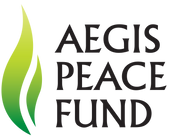OUR STORY
Dr James Smith, Freddy Mutanguha and Alain Lazaret in conversation with three faith leaders, Bangui, 2014
Enabling sustainable livelihoods underpins the impact of peace education and protects communities
Aegis Trust has worked with communities in the Central African Republic (CAR) since 2014, with Rwandan educators training teachers and community leaders to deliver Aegis’ Peace Education. It has been highly effective. However, we learned that while peace education is effective and necessary, it is not sufficient to build resilience when communities are traumatised from violence and atrocities and living with food insecurity. Aegis also learnt that it is possible, though challenging, to implement resilience building projects during an active conflict, to help reduce radicalisation and prevent escalation of violence.

This was demonstrated during political unrest in January 2021 in the capital city, Bangui which became besieged by rebels. The link between economic stress and violence quickly became clear. As the city’s food prices soared, hunger drove young people into violent armed groups and sexual exploitation, threatening the communities within which Aegis had been working. Finding a way to secure the food supplies was essential to prevent this downward spiral. Although the roads had been blockaded by rebels, the airport remained open, and this provided an opportunity for Aegis to at least support the Muslim and Christian communities to which it was connected.
Enterprise Strengthened Community Resilience
Aegis responded by raising a loan of $100,000 and partnered with a local business in Rwanda to buy wheat flour and to organise logistics and airfreight. Aegis subsidised the airfreight through crowdfunding and dry foods were supplied to the women of the communities at the same market prices prior to the siege so they could continue to trade together on the streets.
Food insecurity undermines peace education, but in this case, a solution was facilitated, even the midst of conflict. Through Aegis’ interventions, food supplies continued to run through local traders to stave off hunger without the need for humanitarian ‘hand-outs’ and protected young people from joining the militias and sexual exploitation.
The $100,000 loan was successfully repaid in full with 5% interest within four months. The siege has since lifted, but it is estimated that the market in Bangui at that time would have absorbed 20-50x the food supply of this project, which was only constrained by the lack of rapidly available capital.

Aegis Trust's Community Resilience Model
It was this experience, that inspired Aegis Trust to develop a community resiliency model with three components: peace education, trauma healing and sustainable livelihoods. Together these three components work together to strengthen the resilience of communities and reverse marginalisation, reduce conflict and violence and support communities to recover. Through the Aegis Peace Fund, we address the third component, sustainable livelihoods through enterprise.

Peace Education
Peace education is at the core of Aegis Trust’s activities that addresses the risk of violence in communities. It cultivates empathy, critical thinking and personal responsibility which is essential to build resilience.

Trauma Healing
Trauma healing is the second component. Communities in which Aegis Trust work have often been traumatised by armed conflict, mass atrocities and forced displacement. It is hard for them to rebuild their lives while trauma fuels fear and mistrust. Trauma healing has been shown to contribute to recovery and reconciliation.

Sustainable Livelihoods
Enabling sustainable livelihoods through social enterprise is the third component to build community resilience. Economic crises, political instability and hunger can still leave young people vulnerable to radicalisation, recruitment to armed militia, and sexual exploitation. Through enterprise, we can contribute to preventing food insecurity, adapting o climate change and community resilience.
